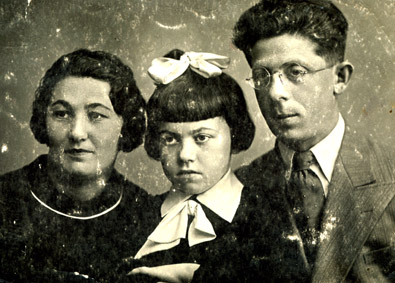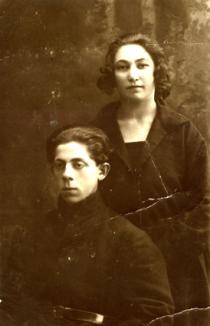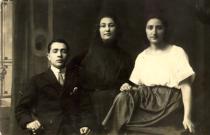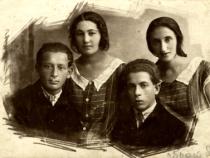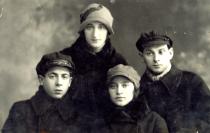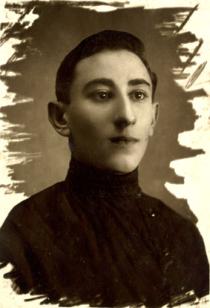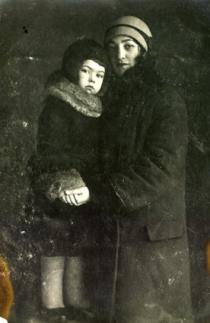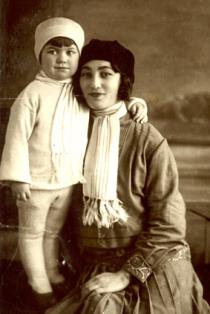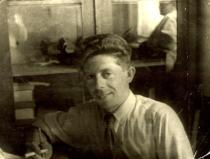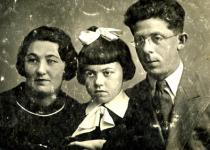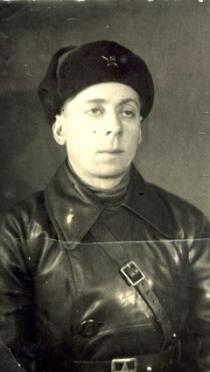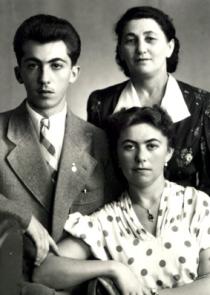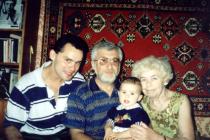I, Isabella Lerman, with my parents - Raisa and Yefim Lerman. This photo was taken in Kiev in 1937, on my birthday in a photo shop in Kreschatik. My parents made it a feast for me: we went for a walk in the town, had ice cream in a cafe, went to the entertainment park and got photographed for the memory. This photo is an embodiment of my happy and cloudless childhood for me.
I was born on 8 August 1928 in Kharkov. I was named Isabella and all I know about it is that I was named some aunt Beti. At first my parents wanted to name me Bertha, but then decided for Bella that developed into Isabella.
My father was a member of the Communist Party that he joined in 1928. Thought he had little education he was a born manager. From a plain worker he was promoted to supervisor of the shoe shop providing services the families of government officials. In 1934 the capital of Ukraine moved from Kharkov to Kiev and our family moved there, too. My father was appointed director of the 'Kommunar' governmental shoe shop. In 1934 we moved to Kiev. In Kiev my father received a big room in a seven-bedroom communal apartment on the fourth (last) floor of a brick house located in the yard. My mother was a housewife and sometimes on Friday we visited my aunt Olga and grandmother Cherna. My grandmother put a nice old silver dinner set on the table and silver wine cups. My grandmother spoke Yiddish to my mother, though she picked Russian living in Kiev. My grandmother recited a prayer, lit candles and we sat down to dinner. Nobody mentioned to me that this was celebration of Sabbath. We never celebrated Jewish holidays at home - my father was a communist and had an official position. I liked Soviet holidays, when our relatives or my father's colleagues got together in our room. They usually got together after a parade, sang Soviet songs and danced to the record player. Some of my parents' friends were Jews. My mother made Jewish food on bigger holidays: gefilte fish, though this wasn't even a tribute to tradition, just delicious food.
In 1936 I went to the first form of a nearby Russian school. I knew that there was a Jewish school in Kiev - my father's distant relative studied there, but my parents probably didn't think it necessary for me to get education in the Jewish language. I studied well and at the end of each academic year I was awarded a certificate and a book. I was one of the first in my class to become a pioneer. The ceremony usually took place on the eve of Soviet holidays: I became a pioneer on the October revolution Day. I remember that my mother arranged a party for me and my schoolmates. She served cakes, cookies and lemonade to us. There were also my favorite sweets: my mother often made sugar and honey sweets at home for me. Generally, I had a happy and fair childhood. I cannot remember anything sad about it before the Great Patriotic War. I had Russian, Ukrainian and Jewish friends, but I never thought about the nationality then. Of course, I knew that I was a Jew, but I didn’t think anything special about it: just another nation like any other, no worse and no better.
My father and mother switched to the Jewish language when they didn’t want me to understand the subject of their discussion. We lived in thee very center of the city near the Ukrainian Drama Theater. My parents went to this and to the Opera Theaters. My mother and father often went to the Jewish Theater located quite near from us. They never missed one performance. My parents also took me with them, probably trying to fill up the gap in my Jewish education. There was also a Jewish Theater for children in Kiev, where my parents also took me, but I can’t remember it as well as I remember the one for adults. Then I decided to become an actress. Since the 1st format school I took part in school performances, the so-called ‘staging’, when children recited slogans taking turns, like ‘five in four, five in four, rather than five..’ about completion of five-year plans in four years. I recited the ‘rather than five’ line. I liked reciting poems and dancing in the school ensemble. I remember, when I had a dark pink tutu made for me for a celebration, but I fell ill and this tutu was never used. In the evacuation I missed it. In 1939 we had a New Year Tree at home for the first time: this was when Soviet authorities allowed the New Year celebration that was forbidden before as vestige of religion. My father brought home a huge tree, as high as the ceiling. I remember Ira Mezhibovskaya with whom we spent a lot of time together. My parents and I went to the cinema. We watched the ‘Circus’ and ‘Merry Guys’ that I liked a lot.
